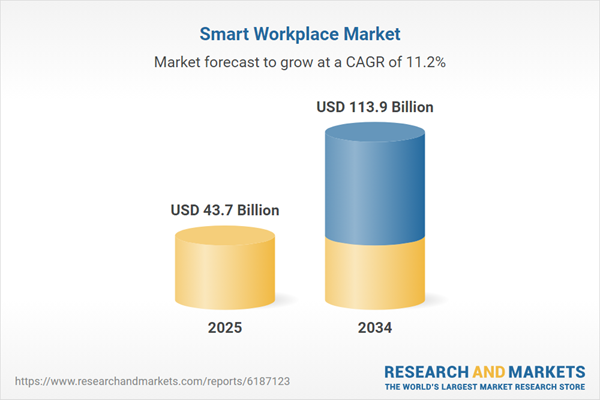The smart workplace market is evolving rapidly as businesses worldwide seek to leverage technology to enhance productivity, improve employee satisfaction, and reduce operational costs. This transformation is largely driven by the integration of digital tools and connected devices that facilitate automation, streamline workflows, and foster collaboration in real-time. The adoption of smart technologies in workplaces ranges from smart lighting and heating systems to advanced collaboration platforms and IoT-enabled office equipment. These innovations contribute to energy efficiency, convenience, and a healthier work environment, ultimately enhancing overall organizational performance. The demand for smarter, more flexible workspaces has gained momentum, especially with the shift towards hybrid work models, where remote and in-office employees need seamless communication and collaboration tools. Additionally, businesses are increasingly focused on creating workplaces that support employee well-being and flexibility, recognizing that the modern workforce values work-life balance and personalized working environments. The smart workplace market is not only driven by technological advancements but also by the growing importance of sustainability in business practices, with smart technologies playing a crucial role in minimizing environmental impact through energy-efficient solutions.
The smart workplace market is expected to witness significant growth, propelled by the ongoing trend of hybrid and remote working models that demand innovative solutions for enhanced collaboration and communication. As businesses continue to invest in smart technologies to meet the needs of the modern workforce, the demand for smart office solutions will increase. These solutions include smart meeting rooms, IoT-enabled desks, voice-activated systems, and AI-powered tools that enable efficient task management and decision-making. With advancements in AI, machine learning, and automation, smart workplaces will become more personalized and responsive, with systems that adapt to individual preferences and improve productivity. Cloud-based collaboration platforms and virtual office solutions will continue to evolve, enabling real-time collaboration between employees across different locations. Furthermore, cybersecurity concerns will drive the demand for enhanced security solutions that protect sensitive data and communications in digital workplace environments. In addition, smart building technologies will increasingly be integrated into office spaces, creating more sustainable, energy-efficient workplaces that align with global environmental goals.
The smart workplace market is poised for even greater advancements as organizations increasingly recognize the value of intelligent systems in shaping the future of work. The widespread adoption of 5G technology and edge computing will further enhance the capabilities of smart office solutions, allowing for faster data processing and improved connectivity. Workplace management systems will become more integrated, offering businesses comprehensive tools to manage everything from facility maintenance to employee wellness and performance tracking. Augmented reality (AR) and virtual reality (VR) technologies will gain traction in training and team collaboration, creating immersive environments that promote engagement and productivity. With a greater focus on employee experience, businesses will invest in smart technologies that prioritize well-being, such as air quality monitoring systems, smart furniture, and ergonomic solutions. As the market matures, the affordability and scalability of smart workplace solutions will improve, allowing small and medium-sized businesses to adopt these technologies. However, the market will also face challenges related to data privacy, security, and the complexities of integrating diverse technologies across various office environments.
Key Insights: Smart Workplace Market
- Hybrid Work Model Integration: The rise of hybrid work environments will drive demand for smart workplace solutions that facilitate seamless communication and collaboration across remote and in-office teams.
- Personalized Workspaces: AI-powered technologies will enable the creation of personalized work environments, improving employee satisfaction and productivity by adapting to individual preferences.
- Smart Building Integration: Increasingly, smart building systems such as energy management, lighting, and HVAC control will be integrated into smart office environments to reduce operational costs and improve sustainability.
- AI and Automation: The use of AI and automation tools will enable organizations to streamline workflows, optimize resource allocation, and automate routine tasks, leading to greater operational efficiency.
- Employee Well-being Focus: There will be a growing focus on technologies that support employee wellness, such as air quality monitoring, ergonomic furniture, and health-tracking devices.
- Increased Demand for Hybrid Work: The ongoing shift towards hybrid and remote working models will continue to drive demand for smart workplace technologies that support seamless communication and collaboration.
- Technological Advancements: Continuous improvements in AI, automation, and IoT technologies will make smart office solutions more efficient, cost-effective, and user-friendly.
- Focus on Sustainability: The push for energy efficiency and environmental sustainability in the workplace will drive the adoption of smart technologies that help reduce carbon footprints.
- Improved Employee Experience: Companies increasingly recognize that enhancing the employee experience through personalized, comfortable, and efficient workspaces is key to attracting and retaining talent.
- Data Privacy and Security: The integration of digital tools and IoT devices in the workplace raises concerns about data privacy and security, requiring businesses to invest in robust security measures to protect sensitive information.
Smart Workplace Market Segmentation
By Product
- Smart Light
- Security Systems
- Energy Management systems
- HVAC Control Systems
- Audio-Video Conferencing Systems
By Office Type
- Retrofit Buildings
- New Construction Offices
By Solution
- Software
- Services
- Managed Services
Key Companies Analysed
- Carrier Corporate
- Honeywell International Inc.
- Johnson Controls
- Daikin Industries
- General Electric Company
- Philips Lumileds
- Acuity Brands
- LG Electronics
- OSRAM Licht AG
- RavenWindow
- Schneider Electric SE
- Research Frontiers
- NICE Systems
- SAGE Electrochromics
- Bosch Security Systems
- Cisco Systems Inc.
- Siemens AG
- Kronos Incorporated
- ATOSS Software AG
- Teem Technologies
- Crestron Electronics Inc.
- Axis Communications
- Koninklijke Philips NV
- United Technologies Corporation
- Signify NV
- Verizon Communications Inc.
- Martela Oyj
- Microsoft Corporation
- Google LLC
- Amazon Web Services Inc.
- Oracle Corporation
Smart Workplace Market Analytics
The report employs rigorous tools, including Porter’s Five Forces, value chain mapping, and scenario-based modeling, to assess supply-demand dynamics. Cross-sector influences from parent, derived, and substitute markets are evaluated to identify risks and opportunities. Trade and pricing analytics provide an up-to-date view of international flows, including leading exporters, importers, and regional price trends.Macroeconomic indicators, policy frameworks such as carbon pricing and energy security strategies, and evolving consumer behavior are considered in forecasting scenarios. Recent deal flows, partnerships, and technology innovations are incorporated to assess their impact on future market performance.
Smart Workplace Market Competitive Intelligence
The competitive landscape is mapped through proprietary frameworks, profiling leading companies with details on business models, product portfolios, financial performance, and strategic initiatives. Key developments such as mergers & acquisitions, technology collaborations, investment inflows, and regional expansions are analyzed for their competitive impact. The report also identifies emerging players and innovative startups contributing to market disruption.Regional insights highlight the most promising investment destinations, regulatory landscapes, and evolving partnerships across energy and industrial corridors.
Countries Covered
- North America - Smart Workplace market data and outlook to 2034
- United States
- Canada
- Mexico
- Europe - Smart Workplace market data and outlook to 2034
- Germany
- United Kingdom
- France
- Italy
- Spain
- BeNeLux
- Russia
- Sweden
- Asia-Pacific - Smart Workplace market data and outlook to 2034
- China
- Japan
- India
- South Korea
- Australia
- Indonesia
- Malaysia
- Vietnam
- Middle East and Africa - Smart Workplace market data and outlook to 2034
- Saudi Arabia
- South Africa
- Iran
- UAE
- Egypt
- South and Central America - Smart Workplace market data and outlook to 2034
- Brazil
- Argentina
- Chile
- Peru
Research Methodology
This study combines primary inputs from industry experts across the Smart Workplace value chain with secondary data from associations, government publications, trade databases, and company disclosures. Proprietary modeling techniques, including data triangulation, statistical correlation, and scenario planning, are applied to deliver reliable market sizing and forecasting.Key Questions Addressed
- What is the current and forecast market size of the Smart Workplace industry at global, regional, and country levels?
- Which types, applications, and technologies present the highest growth potential?
- How are supply chains adapting to geopolitical and economic shocks?
- What role do policy frameworks, trade flows, and sustainability targets play in shaping demand?
- Who are the leading players, and how are their strategies evolving in the face of global uncertainty?
- Which regional “hotspots” and customer segments will outpace the market, and what go-to-market and partnership models best support entry and expansion?
- Where are the most investable opportunities - across technology roadmaps, sustainability-linked innovation, and M&A - and what is the best segment to invest over the next 3-5 years?
Your Key Takeaways from the Smart Workplace Market Report
- Global Smart Workplace market size and growth projections (CAGR), 2024-2034
- Impact of Russia-Ukraine, Israel-Palestine, and Hamas conflicts on Smart Workplace trade, costs, and supply chains
- Smart Workplace market size, share, and outlook across 5 regions and 27 countries, 2023-2034
- Smart Workplace market size, CAGR, and market share of key products, applications, and end-user verticals, 2023-2034
- Short- and long-term Smart Workplace market trends, drivers, restraints, and opportunities
- Porter’s Five Forces analysis, technological developments, and Smart Workplace supply chain analysis
- Smart Workplace trade analysis, Smart Workplace market price analysis, and Smart Workplace supply/demand dynamics
- Profiles of 5 leading companies - overview, key strategies, financials, and products
- Latest Smart Workplace market news and developments
Additional Support
With the purchase of this report, you will receive:- An updated PDF report and an MS Excel data workbook containing all market tables and figures for easy analysis.
- 7-day post-sale analyst support for clarifications and in-scope supplementary data, ensuring the deliverable aligns precisely with your requirements.
- Complimentary report update to incorporate the latest available data and the impact of recent market developments.
This product will be delivered within 1-3 business days.
Table of Contents
Companies Mentioned
- Carrier Corporate
- Honeywell International Inc.
- Johnson Controls
- Daikin Industries
- General Electric Company
- Philips Lumileds
- Acuity Brands
- LG Electronics
- OSRAM Licht AG
- RavenWindow
- Schneider Electric SE
- Research Frontiers
- NICE Systems
- SAGE Electrochromics
- Bosch Security Systems
- Cisco Systems Inc.
- Siemens AG
- Kronos Incorporated
- ATOSS Software AG
- Teem Technologies
- Crestron Electronics Inc.
- Axis Communications
- Koninklijke Philips NV
- United Technologies Corporation
- Signify NV
- Verizon Communications Inc.
- Martela Oyj
- Microsoft Corporation
- Google LLC
- Amazon Web Services Inc.
- Oracle Corporation
Table Information
| Report Attribute | Details |
|---|---|
| No. of Pages | 160 |
| Published | October 2025 |
| Forecast Period | 2025 - 2034 |
| Estimated Market Value ( USD | $ 43.7 Billion |
| Forecasted Market Value ( USD | $ 113.9 Billion |
| Compound Annual Growth Rate | 11.2% |
| Regions Covered | Global |
| No. of Companies Mentioned | 31 |









